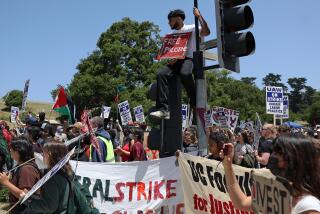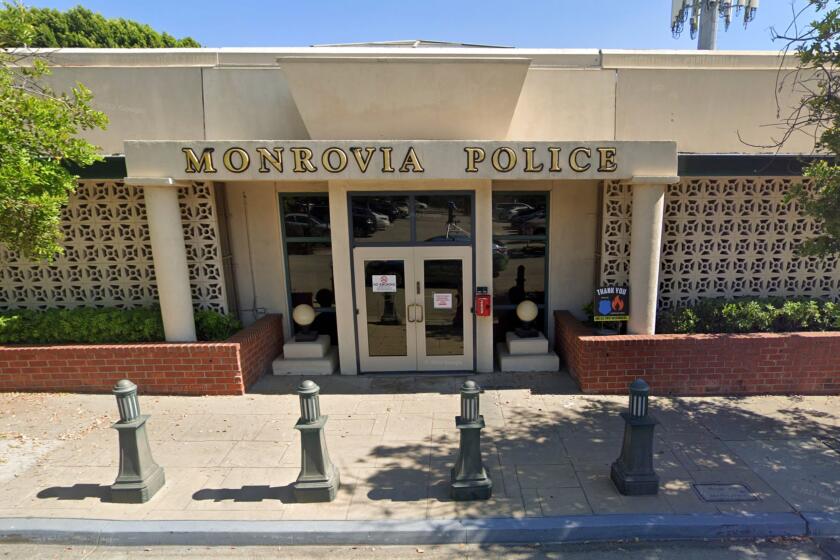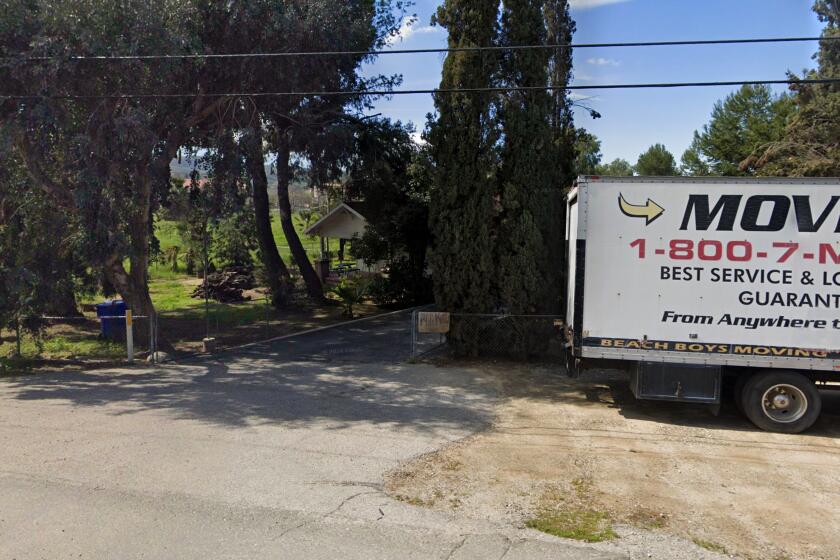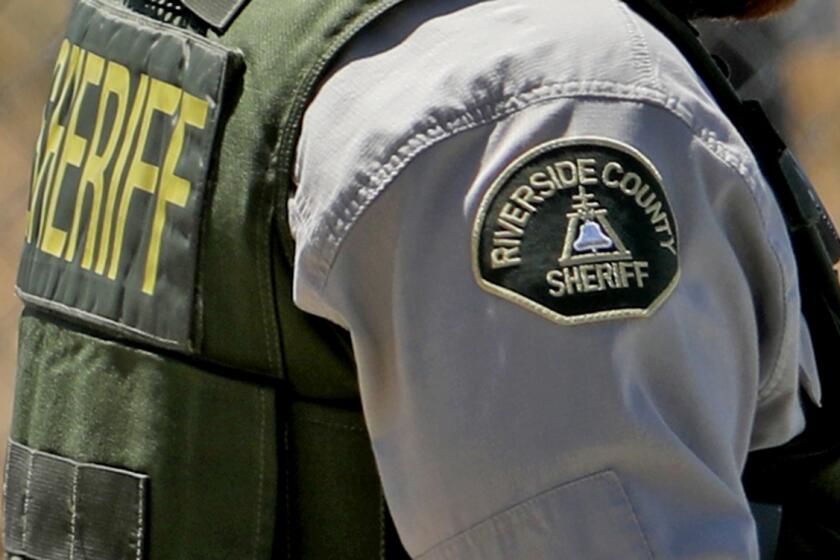Mystery Surrounds Suit Against O.C. Consultants : Courts: Sealed documents allege deceptive fund-raising tactics. Lawyers for the pair dismiss the allegations.
For four years, hundreds of pleadings, motions and depositions taken in a politically sensitive civil suit--enough to fill a pair of three-drawer filing cabinets--have been hidden away in an off-limits room in the basement of the Orange County Superior Court in Santa Ana.
No one seems to know who ordered the suit concealed from public view, or why. No one can find the court order declaring it secret. Even the attorneys cannot--or will not--say how it became sealed.
But documents that have surfaced elsewhere reveal that the sealed records contain accusations that millions of dollars collected from civic-minded Californians by political action committees were transferred to another organization that has never publicly disclosed how the money was spent.
Also sealed from public scrutiny are charges that two controversial and powerful Newport Beach political consultants arranged to be paid nearly half the donated millions as their fees. And the files allude to criminal investigations of certain unnamed defendants.
The adversary of these well-connected political consultants is a shy, 45-year-old accountant from Sherman Oaks, determined in his fight to bring certain matters to light, while his legal battle to do so is inexplicably kept in the dark.
The secret case has been reassigned to at least five different judges, and at least once to a special litigation panel of Superior Court judges when the case became overwhelmingly complex.
And decisions in the lawsuit have bounced up to the Court of Appeal so frequently--at least five times--that when the case was sent back to Superior Court last year, the justices wrote, “If we could issue frequent flyer miles, these (lawsuit) parties would qualify for a free trip somewhere.”
Despite repeated attempts by the two principal defendants, William Butcher and Arnold Forde, to get the lawsuit thrown out, the long-secret suit is scheduled to go to trial in Orange County Superior Court on Monday before a judge without a jury.
Two judges who have presided over the case acknowledge that all documents relating to the lawsuit have been sealed, even though the California Supreme Court has long held “there can be no doubt that court records are public records, available to the public in general.”
“It’s extraordinary,” said Gary Phillips, the plaintiff’s attorney, whose partner accidentally discovered 2 1/2 years ago that the entire case file had been sealed in 1990. “I have no explanation for it. . . . Somebody doesn’t want public scrutiny and I don’t know who or how this happened.”
David Elson, the attorney for Butcher and Forde, said he does not “recall that I filed a motion to seal it.” He speculated that the suit might have been sealed because the plaintiff would be gaining access to “all sorts of information not generally available to the public.”
But local legal experts say they’ve never heard of a case involving these types of allegations being totally sealed from the public. Sealed records, they say, are much more routine in civil cases involving such things as children and family disputes, trade secrets and defective products.
While the Superior Court records remain secret, some details of the 6-year-old suit can be gleaned from a nearly three-foot thick appeal file taken in 1992 to the Court of Appeal in Santa Ana, which declined to seal its files.
The appellate court records provide a glimpse into the lucrative world of direct-mail fund raising, where campaign consultants like Butcher and Forde, the architects of Howard Jarvis’ Proposition 13 campaign, can charge up to 25 cents for each of the hundreds of thousands of solicitation letters mailed to potential donors during a typical campaign. Other fees can net them millions more.
The files also tell the story of Paul McCauley, the Sherman Oaks accountant who took on Butcher and Forde after he discovered that the California Tax Reduction Movement, the organization they co-founded with Jarvis in the wake of Proposition 13, was not registered with California’s secretary of state.
Nor had the group publicly disclosed how it had spent the millions it took in from the political action committees it had spawned--committees such as the one to dump former state Supreme Court Justice Rose Bird, or the committee to Save Prop. 13.
“I was more than a little shocked to find, here they were, the largest political fund-raiser in the state, and they had not filed a campaign statement,” McCauley said in an interview. “I certainly think the public would like to know where the money went.”
Under the Political Reform Act of 1974, the “receipts and expenditures in election campaigns should be fully and truthfully disclosed in order that the voters may be fully informed and improper practices may be inhibited.”
McCauley sent two letters requesting an investigation to the Fair Political Practices Commission, and a third letter to the Los Angeles County district attorney. When he received no replies, he made use of a little-known section in the Political Reform Act that allows an individual to serve as a “private attorney general” to sue Butcher-Forde Consulting, CTRM--now known as the Howard Jarvis Taxpayer Assn.--and Blanche Kelly, who served as CTRM’s treasurer, for alleged violations of the act.
McCauley said he does not believe that Jarvis, who died in 1986, was in any way responsible for the allegedly deceptive fund-raising practices.
At issue is whether the group was a political action committee that should have been making regular public disclosures of where it was getting its money, and how it was being spent. Its attorneys have argued that it wasn’t subject to the political reform act’s reporting requirements.
“CTRM was a membership organization, just like a labor union. It established political action committees, which raised money in their own names and reported it,” Lawrence Straw, an attorney for the group, said. “McCauley’s got all these crazy theories. . . . Next he’s going to be saying Butcher and Forde were on the grassy knoll when (President) Kennedy was shot.”
Another contested issue is whether Butcher-Forde Consulting was the “de facto” treasurer of CTRM, and therefore financially liable for what McCauley maintains are violations of the Political Reform Act.
In court documents, McCauley contends that Butcher-Forde Consulting used CTRM to set up various political action committees that traded on the Jarvis name and prevailing anti-tax sentiments. The committees would raise money through mass mailings, then transfer much of the proceeds back to CTRM, according to court documents.
The money from these “deceptive fund-raising campaigns” in behalf of CTRM, could then be donated to CTRM and used “to pay BFC’s exorbitant invoices,” say the court documents.
According to a 1985 income tax return McCauley obtained from the Internal Revenue Service, $3.6 million of the $6.9 million the California Tax Reduction Movement spent that year went to fund raising, and nearly $2.5 million was paid to Butcher-Forde as fees. The following year, Butcher-Forde’s fees accounted for 47% of the the group’s expenditures, or $1.8 million, court records state.
“Had they reported all this, then fine,” said Phillips, McCauley’s attorney. “And if the public still wanted to continue sending them money, then P. T. Barnum was right.”
McCauley contends that Butcher-Forde Consulting helped found CTRM in 1978 to “enable (Butcher-Forde Consulting) to acquire a nonprofit bulk rate mailing permit which could be used to obtain cheaper rates on postage, thereby enabling mailings in the name of CTRM to be more profitable.”
CTRM then “lent” its mailing permit to a series of political action committees it formed and controlled--though a federal lawsuit prohibited them from doing so, court documents show. In 1979, Butcher-Forde and CTRM signed their first written contract giving Butcher-Forde five cents for every piece of mail sent out in behalf of CTRM and all of its committees.
Subsequent contracts described in court records bumped that take up to 25 cents per letter, and also paid Butcher-Forde Consulting 17.65% of CTRM’s gross expenditures as a management fee.
One of Butcher-Forde’s mailers in 1986 was a black-bordered fund-raising appeal sent out to 350,000 Jarvis supporters two weeks after Jarvis’ death. The mailing, which also included a photograph of Jarvis and a note from his widow, asked for donations of $10, $15 or $20 to the Howard Jarvis Memorial Fund to campaign for a proposition to overturn a state Supreme Court decision that could weaken Proposition 13.
Another fund-raiser in late 1984 sought to raise money to pay off a purported $349,000 debt left over from an unsuccessful attempt to amend the state Constitution. McCauley contends in court documents that little or no debt existed. Bank statements for the fund-raising committee show that $858,083 was “grossed” from two mass mailings for that fund-raiser. The $530,404 netted by the fund-raiser was “contributed” to CTRM, court records say.
Such allegations have been dismissed by Butcher-Forde’s attorney as “blatant distortions (that) do not raise a single triable issue of fact as to whether the (Butcher-Forde Consulting) defendants intentionally or negligently violated any provision of the Political Reform Act.”
Elson also said McCauley’s claims that his clients are somehow responsible for CTRM are “groundless” and “hypertechnical” and that his clients were simply hired hands who neither controlled nor served as treasurers of the CTRM during the mid-1980s. “Howard Jarvis was in charge. I don’t think anyone would dispute that Howard Jarvis is captain of his own ship,” he said.
In his appellate brief, Elson labeled McCauley a “bounty hunter” out to drive Butcher and Forde from the state.
Should McCauley win the case, he would be entitled to half of everything Butcher and Forde and CTRM should have reported to the state, including both contributions and expenditures. The remaining half would be put in the state’s general fund.
Both Phillips and Elson promised that the truth of the secret suit would become clear when the full case is tried in the coming weeks.
“I never intended this to be a six-year-long lawsuit,” McCauley said. “It’s just when we got into it, the mountain got bigger.”
Times Staff Writer Anna Cekola contributed to this report.
More to Read
Start your day right
Sign up for Essential California for news, features and recommendations from the L.A. Times and beyond in your inbox six days a week.
You may occasionally receive promotional content from the Los Angeles Times.






